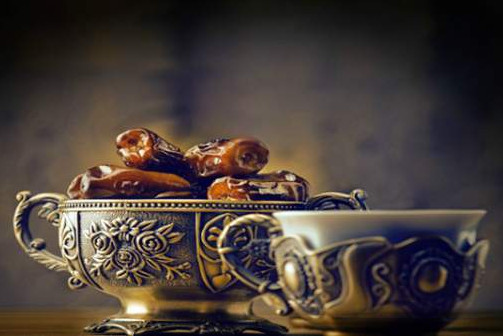
17. Increase four actions in Ramadhaan:
(a) The recitation of the kalimah ‘laa ilaaha illallah’
(b) Istighfaar
(c) Seeking entrance into Jannah
(d) Seeking protection from Jahannum
عن سلمان رضي الله عنه قال خطبنا رسول الله صلى الله عليه و سلم في آخر يوم من شعبان… واستكثروا فيه من أربع خصال خصلتين ترضون بهما ربكم وخصلتين لا غناء بكم عنهما فأما الخصلتان اللتان ترضون بهما ربكم فشهادة أن لا إله إلا الله وتستغفرونه وأما الخصلتان اللتان لا غناء بكم عنهما فتسألون الله الجنة وتعوذون به من النار
Hazrat Salmaan (radhiyallahu anhu) reports that Hazrat Rasulullah (sallallahu alaihi wasallam) delivered a khutbah on the last day of Sha’baan (wherein he mentioned), “And (in this month,) carry out four actions in abundance. Two actions are to please your Rabb and two actions are such that you cannot do without them. The two actions which will be pleasing to your Rabb are the recitation of the kalimah “Laa ilaaha illallah” and seeking His forgiveness. The two actions that you cannot do without are asking Allah Ta’ala for entry into Jannah, and seeking deliverance from the fire of Jahannum.”
18. Make abundant dua during Ramadhaan. The dua of a fasting person is readily accepted, especially the dua that is made before iftaar.
عن أبي هريرة قال قال رسول الله صلى الله عليه وسلم ثلاثة لا ترد دعوتهم الصائم حتى يفطر والإمام العادل ودعوة المظلوم يرفعها الله فوق الغمام ويفتح لها أبواب السماء ويقول الرب وعزتي لأنصرنك ولو بعد حين (سنن الترمذي، الرقم: 3598)
Hazrat Abu Hurairah (radhiyallahu anhu) reports that Hazrat Rasulullah (sallallahu alaihi wasallam) said, “There are three people whose duas are not rejected; the fasting person until he breaks his fast, the just ruler, and the dua of the oppressed which Allah Ta’ala lifts above the clouds and for which He opens the doors of the heavens. Allah Ta’ala says, ‘I take a qasm on My honour, I will definitely assist you, even though it may be after some time.’”
عن عمرو بن شعيب عن أبيه عن جده قال سمعت رسول الله صلى الله عليه وسلم يقول للصائم عند إفطاره دعوة مستجابة وكان عبد الله بن عمرو إذا أفطر دعا أهله وولده ودعا (شعب الايمان، الرقم: 3624)
Hazrat Abdullah bin Amr (radhiyallahu anhuma) reports that Hazrat Rasulullah (sallallahu alaihi wasallam) said, “At the time of iftaar, the fasting person’s duas are accepted.” Hence, Abdullah bin Amr (radhiyallahu anhuma) would call his family and children at the time of iftaar and engage in dua.
19. The month of Ramadhaan is known as the month of the Quraan. Hence, one should recite as much Quraan as possible. The Haafiz should recite more than the non-Haafiz.
20. Be generous in the month of Ramadhaan. Nabi (sallallahu alaihi wasallam) would express more generosity in the month of Ramadhaan compared to other months of the year.
عن ابن عباس رضي الله عنهما قال كان رسول الله صلى الله عليه وسلم أجود الناس وكان أجود ما يكون في رمضان حين يلقاه جبريل وكان يلقاه في كل ليلة من رمضان فيدارسه القرآن فلرسول الله صلى الله عليه وسلم أجود بالخير من الريح المرسلة (صحيح البخاري، الرقم: 6)
Hazrat Ibnu Abbaas (radhiyallahu anhuma) reports that Rasulullah (sallallahu alaihi wasallam) was the most generous of people. He would reach the peak of his generosity in the month of Ramadhaan when Jibreel (alaihis salaam) would come to meet him (to make dhor and revise the Quraan Majeed). Jibreel (alaihis salaam) would meet him every night in Ramadhaan wherein they both used to recite the Quraan Majeed to each other. Rasulullah (sallallahu alaihi wasallam) was more generous than the (beneficial) wind that blew (i.e. the wind is known for having no boundaries and it reaches all places, hence the generosity of Rasulullah (sallallahu alaihi wasallam) even surpassed the limits of the wind in showing love and compassion to the creation).
21. There is abundant barakah (blessings) in waking up for sehri. Hence, one should fulfil the sunnah of sehri before commencing the fast.
عن أبي سعيد الخدري رضي الله عنه قال قال رسول الله صلى الله عليه وسلم السحور اكله بركة فلا تدعوه ولو أن يجرع أحدكم جرعة من ماء فإن الله عز وجل وملائكته يصلون على المتسحرين (مسند أحمد، الرقم: 11086)
Hazrat Abu Sa’eed Khudri (radhiyallahu anhu) reports that Hazrat Rasulullah (sallallahu alaihi wasallam) said, “Sehri contains abundant blessings. Hence, do not omit the sunnah of sehri, even if one is only able to have a sip of water at the time of sehri (one should do so in order to fulfil the sunnah of sehri). Certainly, Allah Ta’ala showers His special grace upon those who wake up for sehri and the angels make special dua for them.”
وعن عمرو بن العاص رضي الله عنه قال قال رسول الله صلى الله عليه وسلم فصل ما بين صيامنا وصيام أهل الكتاب أكلة السحر (صحيح مسلم، الرقم: 1096)
Hazrat Amr bin Aas (radhiyallahu anhu) reports that Hazrat Rasulullah (sallallahu alaihi wasallam) said, “The difference between our fasts and the fasts of the Ahl-e-Kitaab is the eating of sehri.”
 Ihyaaud Deen An Effort to Revive Deen in Totality
Ihyaaud Deen An Effort to Revive Deen in Totality



